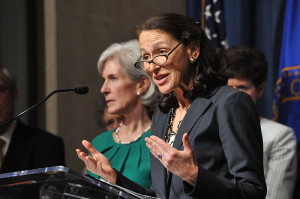FDA intends to pursue regulation of laboratory-developed tests (LDTs) as medical devices, according to FDA Commissioner Hamburg
FDA regulation of laboratory-developed tests (LDTs) is getting attention again. In recent weeks, FDA Commissioner Margaret Hamburg, M.D. put the clinical laboratory industry on notice that the commission intends to pursue regulation of LDTs.
Pathologists and clinical laboratory scientists have long used LDTs to solve clinical diagnostic problems and as a way to use new technologies to address unmet clinical challenges. As a result, these medical laboratory tests are critically important to the growth of personalized medicine.
LDTs Are Clinical Laboratory Tests Used to Diagnose Disease
But Hamburg, in her role as FDA commissioner recently stated, these tests are marketed and sold without FDA premarket review or approval. That means the FDA has not determined “whether they are safe and effective—whether they are accurate and clinically valid. And that can be a problem,” Hamburg told Forbes magazine recently.
While admitting that advanced diagnostics are the cornerstone of personalized medicine, Hamburg said of LDTs, “…not all complex diagnostics used in cancer diagnosis or treatment have been developed to perform at the same demonstrated standards.”
In response to Hamburg’s challenge, the American Clinical Laboratory Association (ACLA) filed a citizen petition on June 4 challenging the FDA’s authority to regulate LDTs as medical devices under the federal Food, Drug, and Cosmetic Act (FDCA).
Citizens Petition Filed by American Clinical Laboratory Association
In its petition, the ACLA wrote: “LDTs are in vitro assays that clinical laboratories develop as testing services according to their own procedures. These tests are often created in response to unmet clinical needs, and are commonly used for early and precise diagnosing, monitoring, and guiding patient treatment.

Shown above is Margaret Hamburg, M.D., Commissioner of the Food & Drug Administration (FDA). In recent weeks, she has publicly discussed the FDA’s intent to regulate laboratory-developed tests (LDTs). This is a subject of great concern to pathologists and clinical laboratory scientists because of its potential, among other things, to bring a substantial number of medical lab tests used daily in clinical settings, under regulatory oversight by the FDA. (Photo from www.wikimedia.org)
“LDTs are also used to diagnose and assess diseases and disorders for which no FDA-authorized test kit currently exists, such as rare diseases, or those with small patient populations,” ACLA said, in announcing filing of the petition. “Indeed, in some cases, LDTs represent the standard of care. The ability of laboratories to develop custom diagnostic tests has been critical to the growth of personalized medicine and to keep pace with the changing face of disease.”
In addition, ACLA argued that medical laboratories themselves are highly regulated under the Clinical Laboratory Improvement Amendments (CLIA) of 1988. On the subject of CLIA regulation, the FDA itself says that CLIA “established quality standards for all laboratory testing to ensure the accuracy, reliability and timeliness of patient test results regardless of where the test was performed.”
CLIA Regulates High Complexity Medical Laboratories
High complexity laboratories must undergo additional certification to ensure the clinical validity of tests, the ACLA petition stated. “CLIA allows laboratories the flexibility to develop and validate LDTs quickly to respond to public health needs,” the ACLA wrote in its petition. “Laboratories are able to update LDTs regularly as medicine advances, so that patients have access to the most advanced testing.”
The distinction between LDTs and in vitro diagnostic (IVD) test kits—which the FDA regulates as medical devices—is important the ACLA argued. Conversely, LDTs are not devices as defined by the FDCA, in part because they lack the requisite commercial distribution the FDA requires.
Instead, LDTs are laboratory services, not products, and are not distributed, nor delivered or placed into market, noted the petition. “They are proprietary procedures for performing a diagnostic test using reagents and laboratory equipment… essentially know-how…” wrote the ACLA.
There are concerns that FDA regulation of LDTs could stifle innovation and limit patient access to these diagnostic services. Many LDTs are “gold standard” DNA assays used to detect rare diseases and screen newborns, explained the petition.
To support her arguments in favor of FDA regulation of LDTs, Hamburg cited OvaSure. This is a blood test aimed at detecting ovarian cancer at an early stage that Laboratory Corporation of America introduced in 2008 without getting FDA clearance, The New York Times. After the FDA said LabCorp failed to prove that the test worked as described, LabCorp stopped sales of the test just four months after it introduced it.
Petition Filed in 1992 on Behalf of Medical Laboratory Profession
Jeffrey Gibbs is a lawyer with Hyman, Phelps & McNamara and an expert on FDA issues. He told Reuters that the FDA has considered LDT regulations since 1992. At the time, Gibbs filed a petition on behalf of clinical laboratories, arguing that the FDA lacked the power to regulate laboratory tests, Reuters reported.
The FDA rejected that petition in 1998. Any attempt by the FDA to regulate laboratory-developed tests now would be controversial, difficult to administer and likely to trigger legal challenges from the industry, Gibbs told Reuters.
One fact about clinical laboratory testing represents a big challenge for the FDA in its intent to regulate LDTs. A large number of medical laboratory tests that have been in use for decades and are run daily in labs throughout the country. These LDTs have broad clinical acceptance.
Pathologists and clinical laboratory managers understand how FDA regulation of the entire menu of tests that currently fall under the legal definition of “laboratory-developed tests” would be disruptive to patient care. Further, for a substantial number of these regularly used and long-accepted LDTs, regulation will create an unnecessary and expensive burden on the nation’s clinical laboratory industry.
—By Joseph Burns
Related Information:
FDA Commissioner Hints At New Diagnostic Test Regulations
Battle brews over FDA regulation of laboratory-developed tests
Cancer Test for Women Raises Hope, and Concern
F.D.A. Says Cancer Test Failed to Get Its Approval



